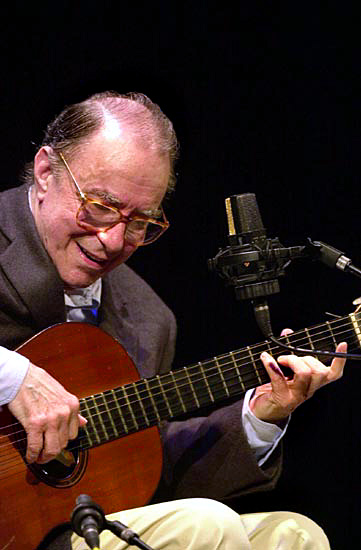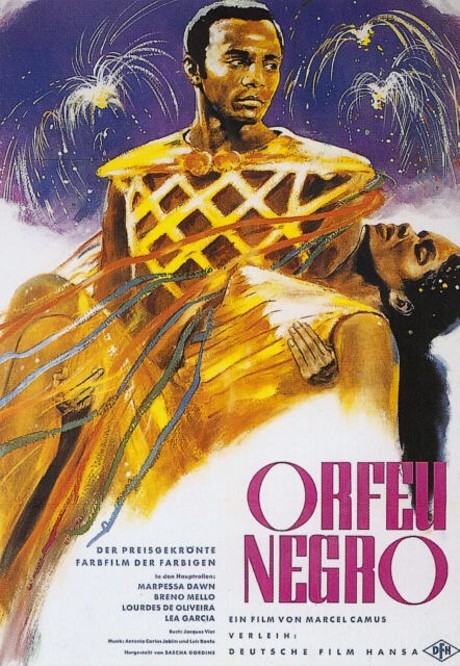|
Bossa
Bossa nova () is a style of samba developed in the late 1950s and early 1960s in Rio de Janeiro, Brazil. It is mainly characterized by a "different beat" that altered the harmonies with the introduction of unconventional chords and an innovative syncopation of traditional samba from a single rhythmic division. The "bossa nova beat" is characteristic of a samba style and not of an autonomous genre. According to the Brazilian journalist Ruy Castro, the bossa beat – which was created by the drummer Milton Banana – was "an extreme simplification of the beat of the samba school", as if all instruments had been removed and only the tamborim had been preserved. In line with this thesis, musicians such as Baden Powell, Roberto Menescal, and Ronaldo Bôscoli also claim that this beat is related to the tamborim of the samba school. One of the major innovations of bossa nova was the way to synthesize the rhythm of samba on the classical guitar. According to musicologist Gilberto Mend ... [...More Info...] [...Related Items...] OR: [Wikipedia] [Google] [Baidu] |
Samba
Samba (), also known as samba urbano carioca (''urban Carioca samba'') or simply samba carioca (''Carioca samba''), is a Brazilian music genre that originated in the Afro-Brazilian communities of Rio de Janeiro in the early 20th century. Having its roots in Brazilian folk traditions, especially those linked to the primitive rural samba of the colonial and imperial periods, it is considered one of the most important cultural phenomena in Brazil and one of the country's symbols. Present in the Portuguese language at least since the 19th century, the word "samba" was originally used to designate a "popular dance". Over time, its meaning has been extended to a "batuque-like circle dance", a dance style, and also to a "music genre". This process of establishing itself as a musical genre began in the 1910s and it had its inaugural landmark in the song "Pelo Telefone", launched in 1917. Despite being identified by its creators, the public, and the Brazilian music industry as "samba" ... [...More Info...] [...Related Items...] OR: [Wikipedia] [Google] [Baidu] |
João Gilberto
João Gilberto (born João Gilberto Prado Pereira de Oliveira – ; 10 June 1931 – 6 July 2019) was a Brazilian guitarist, singer and composer who was a pioneer of the musical genre of bossa nova in the late 1950s. Around the world, he was often called "father of bossa nova"; in his native Brazil, he was referred to as ''"O Mito"'' ("The Legend"). Early life João Gilberto was born in Juazeiro, Bahia, the son of Joviniano Domingos de Oliveira, a wealthy merchant, and Martinha do Prado Pereira de Oliveira. He lived in his native city until 1942, when he began to study in Aracaju, Sergipe, returning to Juazeiro in 1946. At the age of 14, Gilberto got his first guitar from his grandfather despite disapproval from Gilberto's father. Still in Juazeiro, he formed his first band, called "Enamorados do Ritmo". Gilberto moved to Salvador, Bahia, in 1947. During his three years in the city, he dropped out of his studies to dedicate himself exclusively to music and at the age of 18 be ... [...More Info...] [...Related Items...] OR: [Wikipedia] [Google] [Baidu] |
Jazz
Jazz is a music genre that originated in the African-American communities of New Orleans, Louisiana in the late 19th and early 20th centuries, with its roots in blues and ragtime. Since the 1920s Jazz Age, it has been recognized as a major form of musical expression in traditional and popular music. Jazz is characterized by swing and blue notes, complex chords, call and response vocals, polyrhythms and improvisation. Jazz has roots in European harmony and African rhythmic rituals. As jazz spread around the world, it drew on national, regional, and local musical cultures, which gave rise to different styles. New Orleans jazz began in the early 1910s, combining earlier brass band marches, French quadrilles, biguine, ragtime and blues with collective polyphonic improvisation. But jazz did not begin as a single musical tradition in New Orleans or elsewhere. In the 1930s, arranged dance-oriented swing big bands, Kansas City jazz (a hard-swinging, bluesy, improvisationa ... [...More Info...] [...Related Items...] OR: [Wikipedia] [Google] [Baidu] |
Roberto Menescal
Roberto Menescal (born October 25, 1937) is a Brazilian composer, record producer, guitarist, vocalist, and pioneer of bossa nova. In many of his songs there are references to the sea, including his best-known composition "O Barquinho" ("Little Boat"). He is also known for work with Carlos Lyra, Nara Leão, Wanda Sá, Ale Vanzella, and many others. Menescal has performed in Latin music genres such as Música popular brasileira (Brazilian pop), bossa nova, and samba. He was nominated for a Latin Grammy for his work with his son's bossa group Bossacucanova in 2002 and received the 2013 Latin Recording Academy Special Awards in Las Vegas in November 2013.Roberto Menescal to receive a Latin Grammy 2013 http://latingrammy.prod.acquia-sites.com/en/news/2013-latin-recording-academy-special-awards Career In 1957, he worked as sideman for Sylvia Telles in Brazil. A year later he started a guitar school with Carlos Lyra. He formed one of the earliest bossa nova bands with Bebeto, Henriq ... [...More Info...] [...Related Items...] OR: [Wikipedia] [Google] [Baidu] |
Baden Powell (guitarist)
Baden Powell de Aquino (; 6 August 1937 – 26 September 2000), known professionally as Baden Powell, was a Brazilian guitarist. He combined classical techniques with popular harmony and swing. He performed in many styles, including bossa nova, samba, Brazilian jazz, Latin jazz and MPB. He performed on stage during most of his lifetime. Powell composed many pieces for guitar, such as "Abração em Madrid", "Braziliense", "Canto de Ossanha", "Casa Velha", "Consolação", "Horizon", "Imagem", "Lotus", "Samba", "Samba Triste", "Simplesmente", "Tristeza e Solidão", and "Samba da Benção". He released ''Os Afro-sambas'', a watershed album in MPB, with Vinicius de Moraes in 1966. Biography Baden Powell de Aquino was born in Varre-Sai in Rio de Janeiro, Brazil. His father, a Scouting enthusiast, named him after Robert Baden-Powell. When he was three months old, his family relocated to the Rio suburb of São Cristóvão. His house was a stop for popular musicians during his formative ... [...More Info...] [...Related Items...] OR: [Wikipedia] [Google] [Baidu] |
Music Of Brazil
The music of Brazil encompasses various regional musical styles influenced by European, American, African and Amerindian forms. Brazilian music developed some unique and original styles such as forró, repente, coco de roda, axé, sertanejo, samba, bossa nova, MPB, música nativista, pagode, tropicália, choro, maracatu, embolada (coco de repente), frevo, brega, modinha and Brazilian versions of foreign musical styles, such as rock, pop music, soul, hip-hop, disco music, country music, ambient, industrial and psychedelic music, rap, classical music, fado, and gospel. Samba has become the most known form of Brazilian music worldwide, especially because of the country's carnival, although bossa nova, which had Antônio Carlos Jobim as one of its most acclaimed composers and performers, have received much attention abroad since the 1950s, when the song " Desafinado", interpreted by João Gilberto, was first released. The first four winners of the Shell Brazilian Mu ... [...More Info...] [...Related Items...] OR: [Wikipedia] [Google] [Baidu] |
Black Orpheus
''Black Orpheus'' ( Portuguese: ''Orfeu Negro'' ) is a 1959 romantic tragedy film made in Brazil by French director Marcel Camus and starring Marpessa Dawn and Breno Mello. It is based on the play ''Orfeu da Conceição'' by Vinicius de Moraes, which is itself an adaptation of the Greek legend of Orpheus and Eurydice, set in the modern context of a ''favela'' in Rio de Janeiro during ''Carnaval''. The film was an international co-production among production companies in Brazil, France and Italy. The film is particularly noted for its soundtrack by two Brazilian composers: Antônio Carlos Jobim, whose song " A felicidade" opens the film; and Luiz Bonfá, whose " Manhã de Carnaval" and "Samba de Orfeu" have become classics of ''bossa nova''. The songs sung by the character Orfeu were dubbed by singer Agostinho dos Santos. Lengthy passages of the film were shot in the Morro da Babilônia, a ''favela'' in the Leme neighbourhood of Rio de Janeiro. ''Black Orpheus'' won t ... [...More Info...] [...Related Items...] OR: [Wikipedia] [Google] [Baidu] |
Samba-jazz
Samba-jazz or jazz samba is an instrumental subgenre of samba that emerged in the bossa nova ambit in the late 1950s and early 1960s in Brazil. The style consolidated the approach of Brazilian samba with American jazz, especially bebop and hard bop, jazzy styles quite experienced by Brazilian musicians in scope of gafieiras and nightclubs especially in Rio de Janeiro. Having its initial formation based on the piano, the double bass and the drums, samba-jazz gradually absorbed broader musical instruments. Unlike bossa nova, which is a style of samba characterized by its intimate spirit, soft sound and the restraint of sound elements, samba-jazz has many elements present in improvising and stridency. Nevertheless as bossa nova became well known, samba-jazz itself was favored by the bossa-novista repertoire, and a whole generation of instrumentalists influenced by American jazz, such as Sérgio Mendes, J.T. Meirelles, Edison Machado, Dom Um Romão, Zimbo Trio, Tamba Trio, Milton ... [...More Info...] [...Related Items...] OR: [Wikipedia] [Google] [Baidu] |
Brazil
Brazil ( pt, Brasil; ), officially the Federative Republic of Brazil (Portuguese: ), is the largest country in both South America and Latin America. At and with over 217 million people, Brazil is the world's fifth-largest country by area and the seventh most populous. Its capital is Brasília, and its most populous city is São Paulo. The federation is composed of the union of the 26 states and the Federal District. It is the largest country to have Portuguese as an official language and the only one in the Americas; one of the most multicultural and ethnically diverse nations, due to over a century of mass immigration from around the world; and the most populous Roman Catholic-majority country. Bounded by the Atlantic Ocean on the east, Brazil has a coastline of . It borders all other countries and territories in South America except Ecuador and Chile and covers roughly half of the continent's land area. Its Amazon basin includes a vast tropical forest, ho ... [...More Info...] [...Related Items...] OR: [Wikipedia] [Google] [Baidu] |
Jazz Standard
Jazz standards are musical compositions that are an important part of the musical repertoire of jazz musicians, in that they are widely known, performed, and recorded by jazz musicians, and widely known by listeners. There is no definitive list of jazz standards, and the list of songs deemed to be standards changes over time. Songs included in major fake book publications (sheet music collections of popular tunes) and jazz reference works offer a rough guide to which songs are considered standards. Not all jazz standards were written by jazz composers. Many are originally Tin Pan Alley popular songs, Broadway show tunes or songs from Hollywood musicals – the Great American Songbook. In Europe, jazz standards and "fake books" may even include some traditional folk songs (such as in Scandinavia) or pieces of ethnic music (such as gypsy melodies) that have been played with a jazz feel by well known jazz players. A commonly played song can only be considered a jazz standar ... [...More Info...] [...Related Items...] OR: [Wikipedia] [Google] [Baidu] |
Milton Banana
Milton Banana (born Antônio de Souza) (23 April 1935 – 22 May 1999) was a Brazilian bossa nova and jazz drummer. A self-taught musician, he is best known for his collaboration with João Gilberto and Stan Getz Stanley Getz (February 2, 1927 – June 6, 1991) was an American jazz saxophonist. Playing primarily the tenor saxophone, Getz was known as "The Sound" because of his warm, lyrical tone, with his prime influence being the wispy, mellow timbre o ... and for his work with the trio he founded. Discography Bossa nova drummers 1935 births 1998 deaths Brazilian drummers 20th-century drummers {{Brazil-musician-stub ... [...More Info...] [...Related Items...] OR: [Wikipedia] [Google] [Baidu] |






